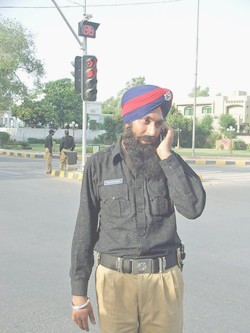Gulab Singh
“Since yesterday, I have been hearing different greetings, such as sat sari kaal, jo bolay so nihal and ballay ballay from car and bus drivers, motorcyclists and children. Lahoris are really very loving people and these are unforgettable moments for me,” remarked Dr Gulab Singh, the first-ever Sikh to be appointed traffic police warden in Pakistan, in an exclusive interview with Daily Times.
Gulab, the 25-year-old Sikh traffic warden, who hails from Nankana Sahib and now lives in Defence Housing Authority, said that joining the force as a sub-inspector was a dream come true for him. Pledging to do his duty wholeheartedly, he said that the loving welcome he had received from the public had added to his joy. He said he had joined his duty station on Wednesday, and by the second day, dozens of children had forced their parents to stop the car so that they could meet him. Singh is deputed on Alif Laam Meem Chowk on Aziz Bhatti Road in Cantt.
Gulab said he was born in Nankana district in January 1982. His father, Manna Singh, is a farmer and a father of seven—five boys and two girls. Gulab is the youngest of the siblings. Gulab completed his matriculation in Nankana district, graudation in Lahore and then received a doctorate in homeopathy from Bahawalpur. Gulab said he also operated a homeopathic clinic, which he might have to shut down because of his new and demanding posting.
Gulab said he applied for the sub-inspector post when announcements inviting applications appeared in newspapers, but did not tell his family. He informed them only after he was appointed, which translated into a delightful surprise for them, he added. Commenting on his training process, Gulab said, “The attitude of my fellow trainees and officers was very good towards me. Nobody ever forced me to do anything against my religious beliefs.” He said he had no problems wearing his kara (bangle), or keeping his kirpan (dagger) on him. He added that, as he was a vegetarian, green meals were arranged for him in the mess during the training period. “I am very grateful to my officers for this gesture,” Gulab said.
Gulab is multilingual and has command over Urdu, Punjabi, Pashto, Seraiki, and Sindhi. He added, “I can also speak English, but not very fluently.” Gulab also said that he was fond of Punjabi bhangra music and that his favourite singers are Abrar-ul-Haq, Harbajhan Maan and Waris Baig. In terms of the future, Gulab said, “I will do my duty honestly, work like a true and dutiful citizen, and dream of a corruption-free atmosphere.”
Gulab Singh II
Founder of the Dallevalia Clan (D. 1759). Was born the son of Shardha Ram at the village of Dalleval, near Dera Baba Nanak on the left bank of the River Ravi, 50 km northeast of Amritsar. In his younger days, he ran a grocery shop in his village and was known as Gulaba Khatri. Having heard tales of heroism of the Sikhs, he came to Amritsar, waited upon Nawab Kapur Singh, and volunteered to become a Sikh. He was advised to grow long hair, practise horsemanship, archery and the use of sword and to come again after a year. Gulaba returned home, won over a small number of young men as companions and commenced a career of adventure. He came to Amritsar on the occasion of Divali accompanied by his band, many of whom were on horseback. Nawab Kapur Singh was highly impressed and, administering initiatory rites to him, named him Gulab Singh.
At the formation of the Dal Khalsa in 1748, Gulab Singh, who had already fought bravely against Nadir Shah in 1739 and in the Chhota Ghallughara in 1746, was declared the head of the Dallevalia misl. Later the Dallevalia and the Nishanvali misls were stationed at Amritsar to protect the holy city.
In 1757 when Ahmad Shah Durrani was returning homeward laden with the booty from Delhi, Mathura and Agra, Gulab Singh made frequent night attacks on his baggage train. At the fords of Ravi and Chenab, Gulab Singh with several other Sikh sardars captured a large number of Afghan horses. Commanding a jatha of 400 men, Gulab Singh plundered Panipat, Rohtak, Hafisi and Hissar.
Gulab Singh died fighting, in 1759, against Ambo Khan of Kalanaur, 27 km west of Gurdaspur.

